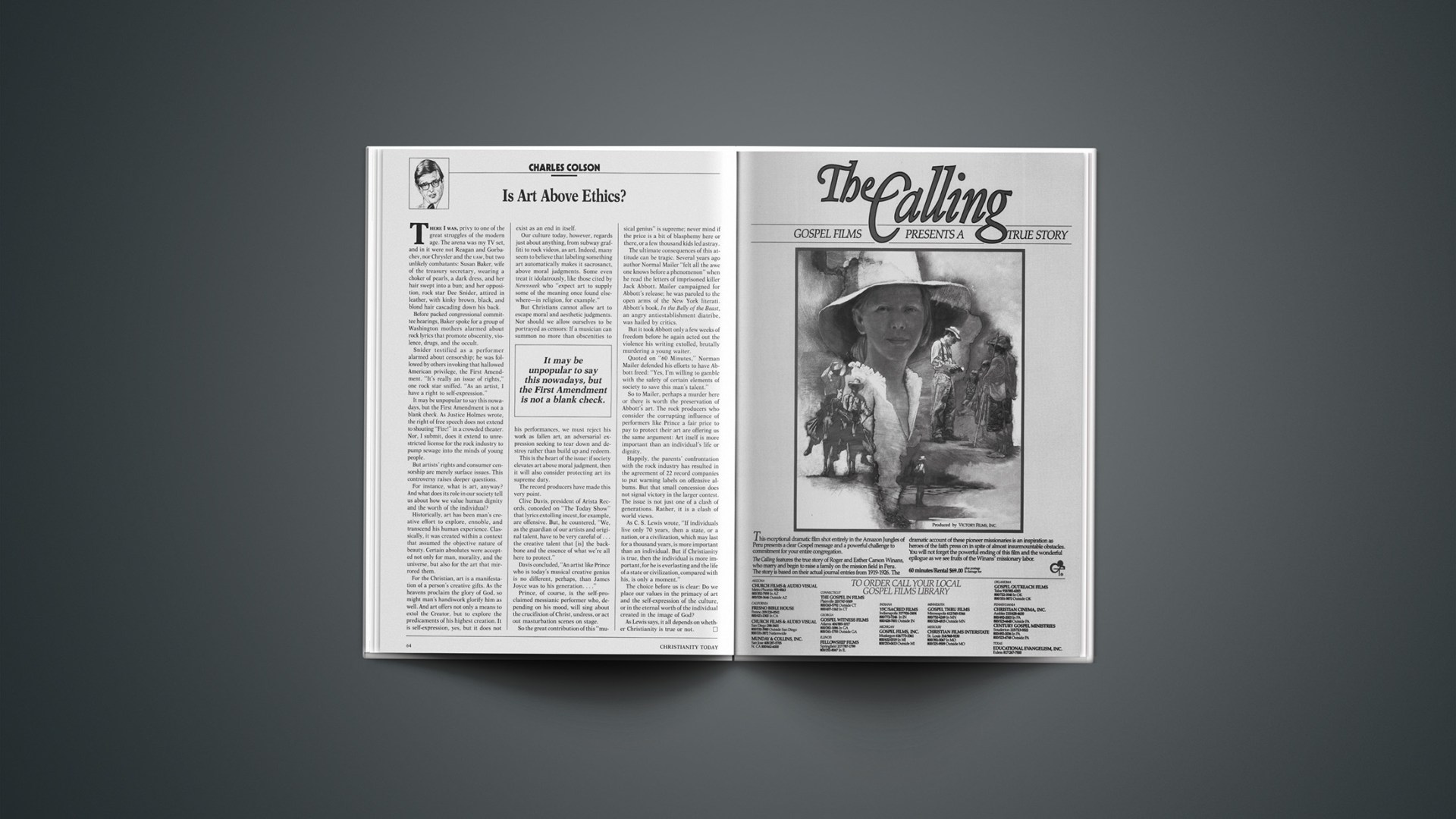There I was, privy to one of the great struggles of the modern age. The arena was my TV set, and in it were not Reagan and Gorbachev, nor Chrysler and the UAW, but two unlikely combatants: Susan Baker, wife of the treasury secretary, wearing a choker of pearls, a dark dress, and her hair swept into a bun; and her opposition, rock star Dee Snider, attired in leather, with kinky brown, black, and blond hair cascading down his back.
Before packed congressional committee hearings, Baker spoke for a group of Washington mothers alarmed about rock lyrics that promote obscenity, violence, drugs, and the occult.
Snider testified as a performer alarmed about censorship; he was followed by others invoking that hallowed American privilege, the First Amendment. “It’s really an issue of rights,” one rock star sniffed. “As an artist, I have a right to self-expression.”
It may be unpopular to say this nowadays, but the First Amendment is not a blank check. As Justice Holmes wrote, the right of free speech does not extend to shouting “Fire!” in a crowded theater. Nor, I submit, does it extend to unrestricted license for the rock industry to pump sewage into the minds of young people.
But artists’ rights and consumer censorship are merely surface issues. This controversy raises deeper questions.
For instance, what is art, anyway? And what does its role in our society tell us about how we value human dignity and the worth of the individual?
Historically, art has been man’s creative effort to explore, ennoble, and transcend his human experience. Classically, it was created within a context that assumed the objective nature of beauty. Certain absolutes were accepted not only for man, morality, and the universe, but also for the art that mirrored them.
For the Christian, art is a manifestation of a person’s creative gifts. As the heavens proclaim the glory of God, so might man’s handiwork glorify him as well. And art offers not only a means to extol the Creator, but to explore the predicaments of his highest creation. It is self-expression, yes, but it does not exist as an end in itself.
Our culture today, however, regards just about anything, from subway graffiti to rock videos, as art. Indeed, many seem to believe that labeling something art automatically makes it sacrosanct, above moral judgments. Some even treat it idolatrously, like those cited by Newsweek who “expect art to supply some of the meaning once found elsewhere—in religion, for example.”
But Christians cannot allow art to escape moral and aesthetic judgments. Nor should we allow ourselves to be portrayed as censors: If a musician can summon no more than obscenities to his performances, we must reject his work as fallen art, an adversarial expression seeking to tear down and destroy rather than build up and redeem.
This is the heart of the issue: if society elevates art above moral judgment, then it will also consider protecting art its supreme duty.
The record producers have made this very point.
Clive Davis, president of Arista Records, conceded on “The Today Show” that lyrics extolling incest, for example, are offensive. But, he countered, “We, as the guardian of our artists and original talent, have to be very careful of … the creative talent that [is] the backbone and the essence of what we’re all here to protect.”
Davis concluded, “An artist like Prince who is today’s musical creative genius is no different, perhaps, than James Joyce was to his generation.…”
Prince, of course, is the self-proclaimed messianic performer who, depending on his mood, will sing about the crucifixion of Christ, undress, or act out masturbation scenes on stage.
So the great contribution of this “musical genius” is supreme; never mind if the price is a bit of blasphemy here or there, or a few thousand kids led astray.
The ultimate consequences of this attitude can be tragic. Several years ago author Normal Mailer “felt all the awe one knows before a phenomenon” when he read the letters of imprisoned killer Jack Abbott. Mailer campaigned for Abbott’s release; he was paroled to the open arms of the New York literati. Abbott’s book, In the Belly of the Beast, an angry antiestablishment diatribe, was hailed by critics.
But it took Abbott only a few weeks of freedom before he again acted out the violence his writing extolled, brutally murdering a young waiter.
Quoted on “60 Minutes,” Norman Mailer defended his efforts to have Abbott freed: “Yes, I’m willing to gamble with the safety of certain elements of society to save this man’s talent.”
So to Mailer, perhaps a murder here or there is worth the preservation of Abbott’s art. The rock producers who consider the corrupting influence of performers like Prince a fair price to pay to protect their art are offering us the same argument: Art itself is more important than an individual’s life or dignity.
Happily, the parents’ confrontation with the rock industry has resulted in the agreement of 22 record companies to put warning labels on offensive albums. But that small concession does not signal victory in the larger contest. The issue is not just one of a clash of generations. Rather, it is a clash of world views.
As C. S. Lewis wrote, “If individuals live only 70 years, then a state, or a nation, or a civilization, which may last for a thousand years, is more important than an individual. But if Christianity is true, then the individual is more important, for he is everlasting and the life of a state or civilization, compared with his, is only a moment.”
The choice before us is clear: Do we place our values in the primacy of art and the self-expression of the culture, or in the eternal worth of the individual created in the image of God?
As Lewis says, it all depends on whether Christianity is true or not.










